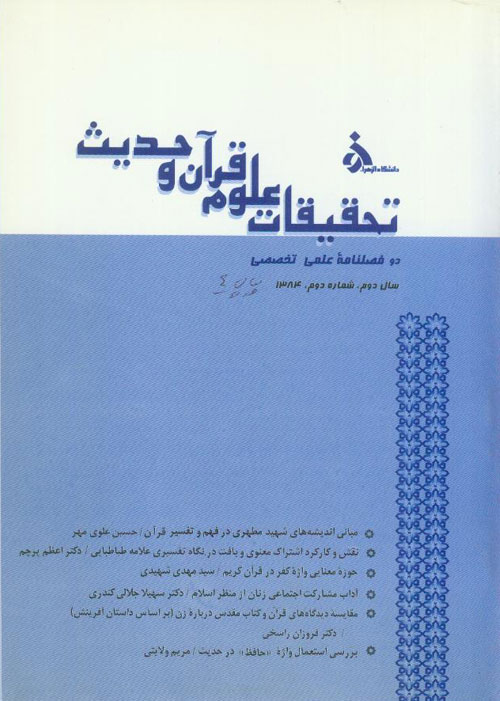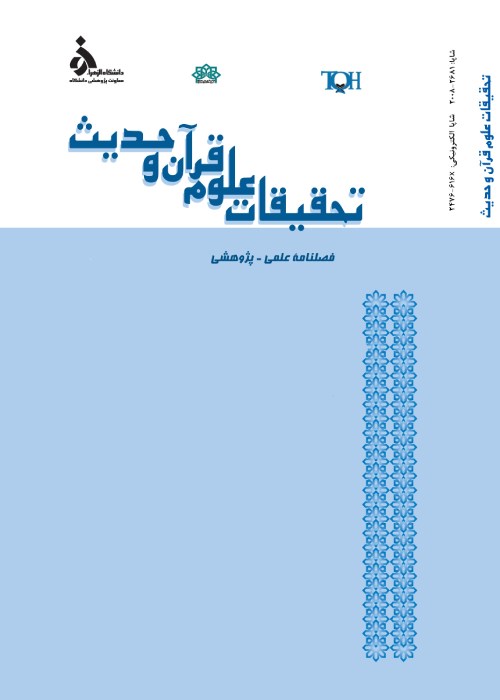فهرست مطالب

مجله تحقیقات علوم قرآن و حدیث
سال دوم شماره 2 (پیاپی 4، پاییز و زمستان 1384)
- تاریخ انتشار: 1384/08/20
- تعداد عناوین: 7
-
-
صفحه 5
- موضوعات قرآنی
-
صفحه 7
مبانی فهم و تفسیر قرآن از عناوین جدید در مباحث قرآن پژوهی است. مبانی فهم و تفسیر قرآن به آن دسته از پیش فرض ها٬ اصول موضوعه و باورهای اعتقادی یا علمی می گویند که مفسر با پذیرش و مبنا قرار دادن ان ها به تفسیر قرآن می پردازد. مبانی گاهی صدوری است و مربوط به صدور قرآن مجید از ناحیه ی ذات اقدس حق تعالی است و گاهی دلالی است و مربوط به فرایند فهم مراد خداوند است٬ استاد مطهری مبنای اول را اصالت انتساب و مبنای دوم را اصالت مطالب و معارف قرآن نامیده اند که از این رهیافت به اصل دیگری٬ یعنی الاهی بودن قرآن به منزله ی معجزه ای جاوید می توان دست یافت.از مهم ترین مبانی دلالتی فهم قرآن کریم طبق آیات قرآن و دلایل عقلی٬ امکان فهم قرآن است و مبانی دیگر عبارتند از: استقلال قرآن در دلالت٬ ارجاع متشابهات به محکمات٬ دوری از هوای نفس٬ تفسیر با امور قطعی و علمی٬ جهانی و جاودانگی.افزون بر مبانی فوق استاد عواملی را به مثابه ی تÃثیرگذار در فهم قرآن از جمله آشنایی با زبان عربی٬ تاریخ اسلام٬ اسباب نزول٬ احادیث و بینش و تدبر را مطرح کرده است.
-
صفحه 27
با توجه به شناخت عمیق علامه طباطبایی از واژه های قرآنی و تداخل مفاهیم واژگانی و اشراف بر انواع بافت ها و سیاق های آیات٬ پدیده ی اشتراک معنوی که از مقوله ی چندمعنایی زبان شناسی است٬ در تفسیر ایشان به خوبی روشن است٬ هرچند ایشان در تفسیر به این اصطلاحات اشاره ای نداشته اند. امروزه در بحث های جدید زبان شناسی و معنی شناسی از تداخل مفاهیم واژگانی سخن به میان می آید. قرآن پژوهان اهل سنت آن را در دل اشتراک لفظی تحت عنوان وجوه و نظایر می آورند. نگرش قرآن پژوهان شیعی نظیر ملاصدرا و علامه طباطبایی این تداخل مفاهیم واژگانی را به همراه انواع بافت ها و سیاق های مربوط٬ در درون اشتراک معنایی و دلالت عام قرار می دهد و در این صورت است که از ارزش های قرآن با توجه به روش شناسی جدید بیان شده٬ دستاورد و اعجاز قرآن در ناحیه ی لفظ و معنی رقم می خورد و بالطبع صورت های مهجور قرآن و معارف دینی را در میان نسل جوان از بین می برد و زبان مبلغان دینی را در دفاع از دین تقویت می کند.
-
صفحه 45
واژه ی " کفر" یکی از برجسته ترین واژگان کلیدی در قرآن کریم است. این واژه نقش مهمی در نظام اخلاقی- دینی قرآن (با بار معنایی منفی) دارد٬ و نه تنها مفهومی است که همه ی صفات منفی دیگر بر محور آن می گردد٬ حتی با قرائت سطحی قرآن مجید متقاعد می شویم که نقش مفهوم کفر چنان در همه جا ساری است که انسان حضور آن را در همه ی عبارات و آیاتی که با اخلاق و رفتار آدمی سر و کار دارد حس می کند.در این نوشتار٬ کلمات کانونی واژه ی " کفر" در بیان قرآن مجید مشخص و تبیین می گردد٬ نوع رابطه ی معنایی آن ها در ساختار معنایی بررسی و تحلیل می شود تا سرانجام حوزه ی معنایی واژه ی کõفر و واژگان پیرامونی آن باز شناخته شود.
-
صفحه 65
شواهدی از تاریخ صدر اسلام بر حضور زنان مسلمان در اجتماع و شرکت فعال آنان در عرصه های مختلف سیاسی٬ نظامی٬ فرهنگی و اجتماعی وجود دارد. رسول الله (ص) کوشیدند تا با تربیت مردم و مقرر کردن آداب خاص از یک سو٬ از تباه شدن نیروی زنان جلوگیری کنند و از سوی دیگر٬ مانع بروز وقایع ناگوار شوند.به این ترتیب٬ در آموزه های قرآن و سنت٬ برای مشارکت اجتماعی زنان و در نتیجه اختلاط الزامی آنان با مردان در محیط اجتماعی٬ آدابی رقم خورده است.برخی از این آداب بین زنان و مردان مشترک است٬ مانند خیره نگاه نکردن٬ ستر عورت٬ گفتگوی سالم٬ خلوت نکردن٬ اجتناب از ملاقات طولانی و مکرر و برخی آداب ویژه ی زنان است٬ مانند پوشش بدن به استثنای صورت و دو دست تا مچ٬ خودآرایی نکردن٬ وقار در راه رفتن.
-
صفحه 99
معرفت دینی معرفتی است که از متون مقدس دینی به دست می آید و بر اساس آن شکل می گیرد. یکی از عناصر مهم در این معرفت دیدگاهی است که متن مقدس درباره زنان دارد. در این مقاله برای اطلاع از دیدگاه دینی پیروان قرآن و کتاب مقدس درباره ی زنان به این دو کتاب رجوع کرده و داستان آفرینش و به ویژه هبوط انسان را مدø نظر قرار داده ایم و با مقایسه ی مضامین دو روایت مذکور در قرآن و کتاب مقدس کوشیده ایم تا با نشان دادن وجوه مشترک و اختلاف آن٬ تاثیرات و لوازم و نتایج هر یک از دو روایت را در اندیشه ی پیروانشان به تصویر بکشیم و احیاناð ریشه های بدبینی و بی مهری به زنان را در جوامعی که تحت تاثیر روایت کتاب مقدس بوده اند روشن سازیم.
- موضوعات حدیثی
-
صفحه 113
از دیرباز استعمال واژه ی حافظ در میان دانشمندان علوم حدیث رایج بوده است و همواره آنان برخی از محدثان را با این عنوان خوانده اند. البته این تذکر لازم است که از این واژه در اغلب موارد محدثان اهل سنت سود می جویند. آنچه در این میان باید بررسی شود آن است که از چه رو این لقب را به افراد اطلاق می کنند¿ به عبارت دیگر٬ فرد حافظ در صورت احراز کدامین شرایط حائز این عنوان می شود¿ در گفتار حاضر در پی پاسخ به این پرسش٬ در منابع حدیثی اهل سنت٬ هستیم که در حقیقت ناظر به موارد استعمال این واژه در میان محدثان و دانشمندان رجال و حدیث و کاربردهای آن و همچنین تطبیق موارد کاربردی با مصادیق عینی و سرانجام نتیجه گیری نهایی در این زمینه است.
-
Page 7
Principles of comprehending and interprenting Kur'an is one of the new subjects in Kur'anic studies. Professor Shahid Motahhari as was an expert in Islamic Sciences was also an authority in Kur'anic Sciences and its commentary but he didn't find the opportunity to write an exclusive book on this issue. In this article we have gathered scattered data from his different works including his most important one in this field, called" shenakht-e-Kur'an" in which he has discussed this subject by name of Principles of understanding and interpreting Kur'an. These principles can be divided into two categories: those related la its attribution to Allah and to its denotation. The principles of the latter kind are: comprehensibility of Kur'an, language of Kur'an, independence of Kur'an in its denotation, referring mutushabehat to muhkamat, keeping away from avarice, interpreting according to determined, scientific data, universality and eternality of Ku'ran. In addition to these, being familiar with different knowledge’s that are influential in understanding Kur'an such as Arabic language, history of Islam, occasion of revelation and hadith, reflection, having insight are other important elements in understanding Kur'an, observing which will be the means to achieving correct understanding and avoiding any deviation. Key words: Principles of comprehending and interpreting: attributive principles. Denotative principles, comprehensibility of Kur'an, language of Kur’an, being independent in denotation. Interpreting according to determined and scientific data, universality and eternality of Kur'an, required- knowledge, influental elements in understanding, reflection
Keywords: Shahid Motahhari’s view -
Page 27
With respect to the profound knowledge of 'Allame Tabatabaee about the Qur'anic terms, their interrelationships and their context, polysemy has been analysed in his commentary on the Qur'an although it is not directly referred to. Today in linguistic and semantic discussions on words with multiple senses, Sunni Qur'anic researchers investigate it in the field of homonomy as " Aspects and Such as": while Shi'a researchers such as Molla Sadra and 'Allame Tabatabaee place it within the field of polysomy and general denotation. It is in this case that Qur'an's value is elaborated on the basis 01" the new methodology whereby the miracle of its formula and sense shows itself up. As a result Qur’an and Islamic teachings are no more isolated among the young generation and Islam can he propagated more effectively.
Keywords: homonomy, polysemy, context, Semantics, guidance, deviation -
Page 45
The term "Kufr" is one of the most significant clue words in the Holy Qur'an. This term has an important role in the ethical-religious system of Qur'an (with a negative value). This is not only the core meaning which other negative values encircle it, hut by even a simple survey in Qur'un, we become convinced that the role of the meaning of Kufr is so great that its presence can be felt in every statement and verse concerning human ethic and behavior. In this article the focal words of "Kufr" in its Kur'anic usage are identified and elucidated and their sense relation in their semantic construction is examined and analysied as to identity the semantic field of the term Kufr and the words related to it.
Keywords: semantic field, kufr, fesk, fujur, eteda', esraf -
Page 65
There are some proofs from the early period of Islam that Muslim women had an active role in the society. They participated in different fields: political, military, social and Cultural. By training Muslims and issuing some regulations, the Holy Prophet (SAWA) tried to avoid any corruption to take place as well as women's talents to go waste. Therefore some regulations have been prescribed by Kur'an and hadith for women's participation in society. Some of these refer to both men and women, including having suitable conversation and prohibiting nakedness, staring and being in private. Some others are exclusively for women as observing dignity in walking and talking, covering all body except face and hands from the wrist down, and avoiding any embellishment.
Keywords: dignity, embellishing, covering, suitable conversation -
Page 99
Religious knowledge is the knowledge acquired through the Scriptures and formed according to them. One of the main elements of this knowledge is the Scripture's view concerning women. In order to attain their adherents' opinion, we have studied, in this article, the Kur'an and the Bible, with a focus on the story of creation, especially the humanity's tall. Comparing their narration, its explicit and implicit meanings, we have tried to show their point of divergene and agreement and to picture the implications and results of any of these two narrations on their adherents' thoughts and to find the possible roots of the pessimism, disgrace and even hostility which the societies influenced by these narrations have shown towards women.
Keywords: the Kur'an, the Bible, woman, creation fall, seduction -
Page 113
From a long time ago, the word "Hafez" has been currently used by the hadith scholars as a title; although it should be noted that this title was generally applied to Sunni hadith scholars. But "what are the qualifications needed for applying this title?" this is the question we are trying to find the answer for, in this article. We have studied Sunni hadith books in which this term is defined by hadith and RejaI scholars, we have also examined its usual usage in order to reach a better result.
Keywords: Ha fez, Sunni hadith scholars, Rigal scholars


